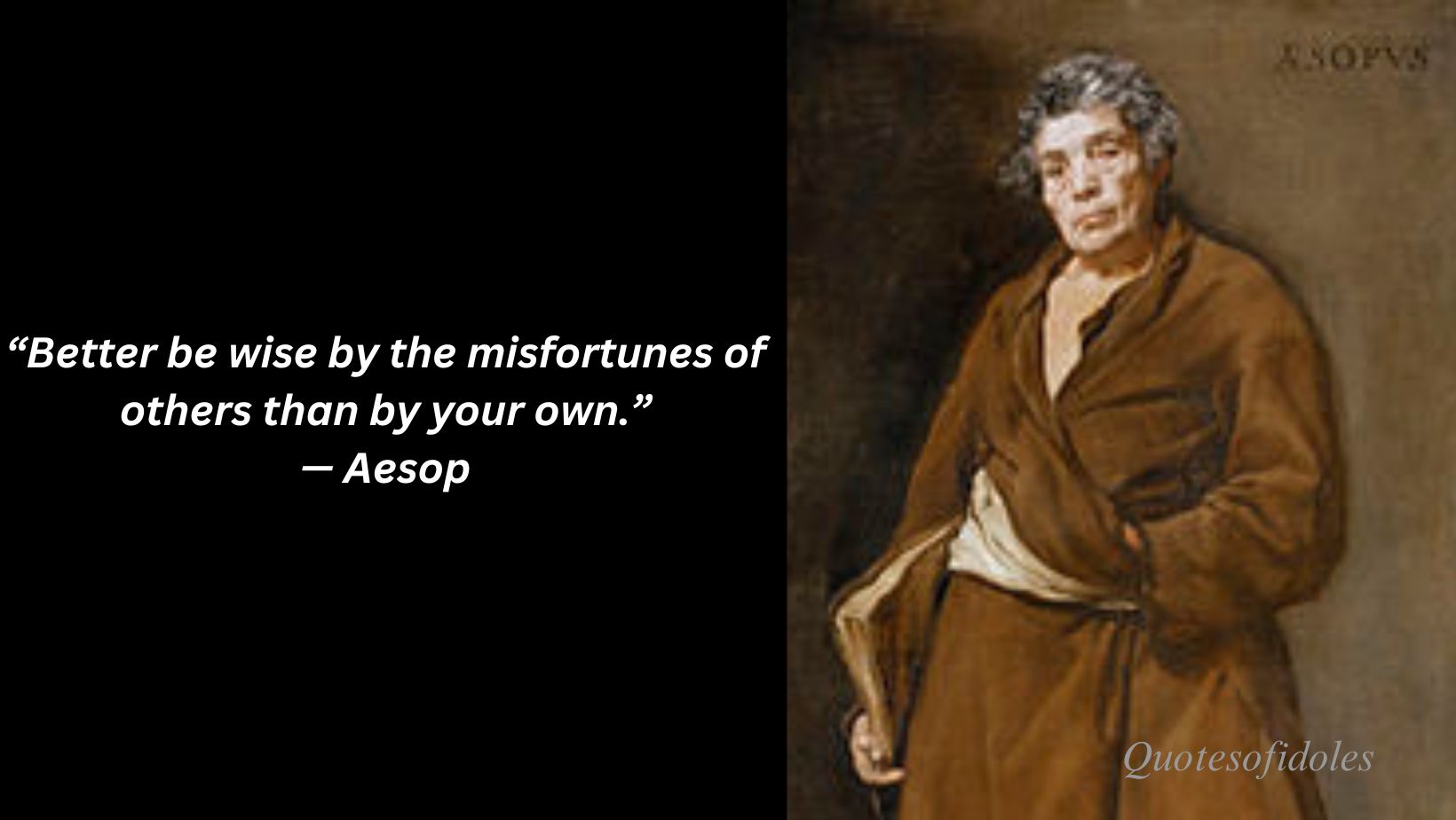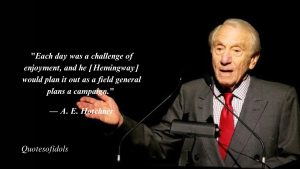
Aesop (formerly rendered as Æsop) was a Greek fabulist and storyteller credited with a number of fables now collectively known as Aesop’s Fables. Although his existence remains unclear and no writings by him survive, numerous tales credited to him were gathered across the centuries and in many languages in a storytelling tradition that continues to this day. Many of the tales associated with him are characterized by anthropomorphic animal characters.
Aesop Quotes
1. “United we stand, divided we fall.”
— Aesop
2. “If you can’t say anything nice, then don’t say anything at all.”
— Aesop
3. “In union there is strength.”
— Aesop
4. “Being a good example teaches others to be good.”
— Aesop
5. “A man is known by the company he keeps.”
— Aesop
6. “Good things come in small packages.”
— Aesop
7. “Once a wolf, always a wolf.”
— Aesop
8. “Be satisfied with what you have.”
— Aesop
9. “Every man for himself.”
— Aesop
10. “A kindness is never wasted.”
— Aesop
11. “Don’t cry over spilt milk.”
— Aesop
12. “Little by little does the trick.”
— Aesop
13. “Beware of a wolf in sheep’s clothing.”
— Aesop
14. “Persuasion is often more effectual than force.”
— Aesop
15. “Gratitude is the sign of noble souls.”
— Aesop
16. “Every man should be content to mind his own business.”
— Aesop
17. “Don’t kill the goose that lays the golden egg.”
— Aesop
18. “It is possible to have too much of a good thing.”
— Aesop
19. “You can fool people some of the time, but you can’t fool them all of the time.”
— Aesop
20. “Please all, and you will please none.”
— Aesop
21. “Pride goes before destruction.”
— Aesop
22. “Poverty with security is better than plenty in the midst of fear and uncertainty.”
— Aesop
23. “The tyrant will always find a pretext for his tyranny.”
— Aesop
24. “There is always someone worse off than yourself.”
— Aesop
25. “Those who cry the loudest are not always the ones who are hurt the most.”
— Aesop
26. “Better to starve free than be a fat slave.”
— Aesop
27. “A fair-minded man tries to see both sides of an argument.”
— Aesop
28. “Kindness is more persuasive than force.”
— Aesop
29. “Destroy the seed of evil, or it will grow up to your ruin.”
— Aesop
30. “Every truth has two sides; it is as well to look at both, before we commit ourselves to either.”
— Aesop
31. “The smaller the mind the greater the conceit.”
— Aesop
32. “The level of our success is limited only by our imagination and no act of kindness, however small, is ever wasted.”
— Aesop
33. “We hang the petty thieves and appoint the great ones to public office.”
— Aesop
34. “Always stop to think whether your fun may be the cause of another’s unhappiness.”
— Aesop
35. “Wise men say nothing in dangerous times.”
— Aesop
36. “A liar will not be believed, even when he speaks the truth.”
— Aesop
37. “An oak and a reed were arguing about their strength. When a strong wind came up, the reed avoided being uprooted by bending and leaning with the gusts of wind. But the oak stood firm and was torn up by the roots.”
— Aesop
38. “Betray a friend, and you’ll often find you have ruined yourself.”
— Aesop
39. “Do not count your chickens before they are hatched.”
— Aesop
40. “Faithful are the wounds of a friend; but the kisses of an enemy are deceitful.”
— Aesop
41. “It is one thing to conceive a good plan, and another to execute it.”
— Aesop
42. “Great determination can overcome most odds.”
— Aesop
43. “Fine clothes may disguise, but silly words will disclose a fool.”
— Aesop
44. “It is easy to despise what you cannot get.”
— Aesop
45. “Evil companions bring more hurt than profit.”
— Aesop
46. “Better be wise by the misfortunes of others than by your own.”
— Aesop
47. “Be content with your lot; one cannot be first in everything.”
— Aesop
48. “The grateful heart will always find opportunities to show its gratitude.”
— Aesop
49. “A person’s true nature will reveal itself despite disguise.”
— Aesop
50. “Those who seek to please everybody please nobody.”
— Aesop
51. “Appearances are often deceiving.”
— Aesop
52. “Injuries may be forgiven, but not forgotten.”
— Aesop
53. “The haft of the arrow had been feathered with one of the eagle’s own Lures. We often give our enemies the means of our own destruction.”
— Aesop
54. “Never trust the advice of a man in difficulties.”
— Aesop
55. “Give assistance, not advice, in a crisis.”
— Aesop
56. “Who acts in haste repents at leisure.”
— Aesop
57. “The hero is brave in deeds as well as words.”
— Aesop
58. “He who plots to hurt others often hurts himself.”
— Aesop
59. “After the rain cometh the fair weather.”
— Aesop
60. “Gentle persuasion succeeds where force fails.”
— Aesop
61. “The fly sat upon the axel-tree of the chariot-wheel and said, What a dust do I raise!”
— Aesop
62. “Uninvited guests are often most welcome when they leave.”
— Aesop
63. “It is easy to be brave from a safe distance.”
— Aesop
64. “I am sure the grapes are sour.”
— Aesop
65. “Distrust unsolicited advice.”
— Aesop
66. “If you choose bad companions, no one will believe that you are anything but bad yourself.”
— Aesop
67. “One story sounds good until another is told.”
— Aesop
68. “Our insignificance is often the cause of our safety.”
— Aesop
69. “Obscurity often brings safety.”
— Aesop
70. “Better beans and bacon in peace than cakes and ale in fear.”
— Aesop
71. “Do not attempt to hide things which cannot be hidden.”
— Aesop
72. “It pays to be prepared.”
— Aesop
73. “Don’t make much ado about nothing.”
— Aesop
74. “Necessity knows no law.”
— Aesop
75. “The unhappy derive comfort from the misfortunes of others.”
— Aesop
76. “Even a hare, the weakest of animals, may insult a dead lion.”
— Aesop
77. “It is one thing to say that something should be done, but quite a different matter to do it.”
— Aesop
78. “Avoid a remedy that is worse than the disease.”
— Aesop
79. “Little friends may prove great friends.”
— Aesop
80. “Harm seek, harm find.”
— Aesop
81. “The strong and the weak cannot keep company.”
— Aesop
82. “Don’t neglect the future in times of plenty, for tomorrow you may need what you wasted today.”
— Aesop
83. “Evil wishes, like chickens, come home to roost.”
— Aesop
84. “Look and see which way the wind blows before you commit yourself.”
— Aesop
85. “I will have nought to do with a man who can blow hot and cold with the same breath.”
— Aesop
86. “Contentment with our lot is an element of happiness.”
— Aesop
87. “What a splendid head, yet no brain.”
— Aesop
88. “Do nothing without regard to the consequences.”
— Aesop
89. “We often despise what is most useful to us.”
— Aesop
90. “A word in season is most precious.”
— Aesop
91. “Much outcry, little outcome.”
— Aesop
92. “Men often applaud an imitation and hiss the real thing.”
— Aesop
93. “Bad as any government may be, it is seldom worse than anarchy.”
— Aesop
94. “It is easy to kick a person when he is down.”
— Aesop
95. “It is in vain to expect our prayers to be heard, if we do not strive as well as pray.”
— Aesop
96. “Every man carries two bags about him, one in front and one behind, and both are full of faults. The bag in front contains his neighbors’ faults, the one behind his own. Hence it is that men do not see their own faults, but never fail to see those of others.”
— Aesop
97. “Notoriety is often mistaken for fame.”
— Aesop
98. “The gods help them who help themselves.”
— Aesop
99. “The greatest kindness will not bind the ungrateful.”
— Aesop
100. “Better one safe way than a hundred on which you cannot reckon.”
— Aesop
101. “The little reed, bending to the force of the wind, soon stood upright again when the storm had passed over.”
— Aesop
102. “Much wants more and loses all.”
— Aesop
103. “Only cowards insult dying majesty.”
— Aesop
104. “Outside show is a poor substitute for inner worth.”
— Aesop
105. “False friends leave you in times of trouble.”
— Aesop
106. “Every tale is not to be believed.”
— Aesop
107. “Vices are their own punishment.”
— Aesop
108. “Those who enter through the back door can expect to be shown out through the window.”
— Aesop
109. “We should look to the mind, and not to the outward appearance.”
— Aesop
110. “Put your shoulder to the wheel.”
— Aesop
111. “Don’t let your special character and values, the secret that you know and no one else does, the truth – don’t let that get swallowed up by the great chewing complacency.”
— Aesop
112. “Equals make the best friends.”
— Aesop
113. “Facts speak plainer than words.”
— Aesop
114. “We often give our enemies the means for our own destruction.”
— Aesop
115. “Self-conceit may lead to self destruction.”
— Aesop
116. “In critical moments even the very powerful have need of the weakest.”
— Aesop
117. “The value is in the worth, not in the number.”
— Aesop
118. “Implementation beats oration.”
— Aesop
119. “Adversity tests the sincerity of friends.”
— Aesop
120. “Any excuse will serve a tyrant.”
— Aesop
121. “Don’t be in a hurry to change one evil for another.”
— Aesop
122. “Here is an Unity Quote that we have all known since school: United we stand; divided we fall.”
— Aesop
123. “Those who return evil for good should not expect the kindness of others to last long.”
— Aesop
124. “If you allow men to use you for your own purposes, they will use you for theirs.”
— Aesop
125. “Those who suffer most cry out the least.”
— Aesop
126. “A doubtful friend is worse than a certain enemy. Let a man be one thing or the other, and we then know how to meet him.”
— Aesop
127. “Every one is more or less master of his own fate.”
— Aesop
128. “The memory of a good deed lives.”
— Aesop
129. “Most arguments are useless.”
— Aesop
130. “Example is the best precept.”
— Aesop
131. “Children are not to be blamed for the faults of their parents.”
— Aesop
132. “Train up a child in the way he should go; and when he is old he will not depart therefrom.”
— Aesop
133. “God helps those who have no-cut contracts.”
— Aesop
134. “Better poverty without a care than wealth with its many obligations.”
— Aesop
135. “He who incites to strife is worse than he who takes part in it.”
— Aesop
136. “Change of habit cannot alter Nature.”
— Aesop
137. “Better to die once and for all, than live in continual terror.”
— Aesop
138. “If words suffice not, blows must follow.”
— Aesop
139. “A Fox entered the house of an actor and, rummaging through all his properties, came upon a Mask, an admirable imitation of a human head. He placed his paws on it and said, “What a beautiful head! Yet it is of no value, as it entirely lacks brains.””
— Aesop
140. “It is with our passions as it is with fire and water, they are good servants, but bad masters.”
— Aesop
141. “If you were foolish enough to sing all the summer, you must dance supperless to bed in the winter.”
— Aesop
142. “No gratitude from the wicked.”
— Aesop
143. “Don’t go looking for trouble.”
— Aesop
144. “Like will draw like.”
— Aesop
145. “Expect no reward when you serve the wicked, and be thankful if you escape injury for your pain.”
— Aesop
146. “He that is hard to please, may get nothing in the end.”
— Aesop
147. “Men often bear little grievances with less courage than they do large misfortunes.”
— Aesop
148. “Liars often set their own traps.”
— Aesop
149. “The least outlay is not always the greatest gain.”
— Aesop
150. “It is thrifty to prepare today for the wants of tomorrow.”
— Aesop
151. “Fair weather friends are not worth much.”
— Aesop
152. “Wealth unused might as well not exist.”
— Aesop
153. “He that is neither one thing nor the other has no friends.”
— Aesop
154. “Better poverty without care, than riches with.”
— Aesop
155. “Better no rule than cruel rule.”
— Aesop
156. “If you are wise you won’t be deceived by the innocent airs of those whom you have once found to be dangerous.”
— Aesop
157. “Beware that you do not lose the substance by grasping at the shadow.”
— Aesop
158. “The desire for imaginary benefits often involves the loss of present blessings.”
— Aesop
159. “No argument, no matter how convincing, will give courage to a coward.”
— Aesop
160. “The more you want, the more you stand to lose.”
— Aesop
161. “We can easily represent things as we wish them to be.”
— Aesop
162. “What’s bred in the bone will stick to the flesh.”
— Aesop
163. “Pray do not grieve so; but go and take a stone, and place it in the hole, and fancy that the gold is still lying there. It will do you quite the same service; for when the gold was there, you had it not, as you did not make the slightest use of it.”
— Aesop
164. “Whoever neglects old friends for the sake of new deserves what e gets if he loses both.”
— Aesop
165. “Keep your place in life and your place will keep you.”
— Aesop
166. “I can’t be friends with a man who blows hot and cold with the same breath.”
— Aesop
167. “You will only injure yourself if you take notice of despicable enemies.”
— Aesop
168. “Zeal should not outrun discretion.”
— Aesop
169. “A crust in comfort is better than a feast in fear.”
— Aesop
170. “Try as one may, it is impossible to deny one’s nature.”
— Aesop
171. “We would often be sorry if our wishes were gratified.”
— Aesop
172. “Never soar aloft on an enemy’s pinions.”
— Aesop
173. “You may share the labors of the great, but you will not share the spoil.”
— Aesop
174. “To be well prepared for war is the best guarantee of peace.”
— Aesop
175. “There are many statues of men slaying lions, but if only the lions were sculptors there might be quite a different set of statues.”
— Aesop
176. “It is not only fine feathers that make fine birds.”
— Aesop
177. “Those who assume a character which does not belong to them, only make themselves ridiculous.”
— Aesop
178. “If men had all they wished, they would be often ruined.”
— Aesop
179. “Clumsy jesting is no joke.”
— Aesop
180. “He that is discontented in one place will seldom be happy in another.”
— Aesop
181. “Straw shows which way the wind is blowing.”
— Aesop
182. “Benefits bestowed upon the evil-disposed, increase their means of injuring you.”
— Aesop
183. “A false tale often betrays itself.”
— Aesop
184. “Precious things are for those that can prize them.”
— Aesop
185. “The Boys and the Frogs SOME BOYS, playing near a pond, saw a number of Frogs in the water and began to pelt them with stones. They killed several of them, when one of the Frogs, lifting his head out of the water, cried out: “Pray stop, my boys: what is sport to you, is death to us.”
— Aesop
186. “It is easy to propose impossible remedies.” The.”
— Aesop
187. “The quarrels of friends are the opportunities of foes.”
— Aesop
188. “In serving the wicked, expect no reward, and be thankful if you escape injury for your pains.”
— Aesop
189. “What is most truly valuable is often underrated.”
— Aesop
190. “He that always gives way to others will end in having no principles of his own.”
— Aesop
191. “In a crisis, give help first and then advice.”
— Aesop
192. “Each person has his strong point.”
— Aesop
193. “Plodding wins the race.”
— Aesop
194. “I thought these grapes were ripe, but I see now they are quite sour.”
— Aesop
195. “Better a long life of toil than a short one of ease.”
— Aesop
196. “While I see many hoof marks going in, I see none coming out. It is easier to get into the enemy’s toils than out again.”
— Aesop
197. “Misfortune tests the sincerity of friendship.”
— Aesop
198. “It is useless attacking the insensible.”
— Aesop
199. “Acquaintance softens prejudice.”
— Aesop
200. “It pays to be content with your lot.”
— Aesop


